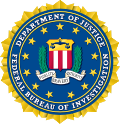William S. Sessions
Just before Bill Clinton was inaugurated as the 42nd president of the United States on January 20, 1993, allegations of ethical improprieties were made against Sessions. A report by outgoing Attorney General William P. Barr presented to the Justice Department that month by the Office of Professional Responsibility included criticisms that he had used an FBI plane to travel to visit his daughter on several occasions, and had a security system installed in his home at government expense. [43] Janet Reno, the 78th Attorney General of the United States, announced that Sessions had exhibited "serious deficiencies in judgment." [44]
Although Sessions denied that he had acted improperly, he was pressured to resign in early July, with some suggesting that President Clinton was giving Sessions the chance to step down in a dignified manner. Sessions refused, saying that he had done nothing wrong, and insisted on staying in office until his successor was confirmed. As a result, President Clinton dismissed Sessions on July 19, 1993, five and a half years into a ten-year term. Clinton's public explanation was that there had been a loss of confidence in Sessions' leadership, and then-Attorney General Reno recommended the dismissal. [45]
Clinton nominated Louis Freeh to be FBI Director on July 20. Then-FBI deputy director Floyd I. Clarke, who Sessions suggested had led a coup to force his removal, served as acting director until September 1, 1993, when Freeh was sworn in. [46]
James Comey
On May 9, 2017, President Trump dismissed Comey after the recommendation of United States Attorney General Jeff Sessions and Deputy Attorney General Rod Rosenstein. [47] Rosenstein's memorandum to Sessions objected to Comey's conduct in the investigation into Hillary Clinton's emails. [48] This was contradicted by multiple unnamed sources to news outlets, who said that Trump and high-level officials personally asked for Comey to be fired. [49] [50] Comey was fired after he asked for more money for the investigations into Russian interference in the 2016 United States elections. [51] Many members of Congress, mostly Democrats, expressed concern over the firing and argued that it would put the integrity of the investigation into jeopardy. [52]
Comey's termination was immediately controversial, even being characterized as corrupt by news commentators. It was compared, by the aforementioned news outlets, to the Saturday Night Massacre, President Richard Nixon's termination of special prosecutor Archibald Cox, who had been investigating the Watergate scandal, [53] [54] and to the firing of Acting Attorney General Sally Yates in January 2017.
In the dismissal letter Trump stated that Comey had asserted "on three separate occasions that I am not under investigation" which was later confirmed by Comey to the Senate while under oath. [55] This is disputed by reporting from multiple news agencies with multiple sources. According to the reporting, Trump had been openly talking about firing Comey for at least a week before his dismissal. Trump and Democratic leaders had long questioned Comey's judgment. Moreover, Trump was angry that Comey would not support his claim that President Barack Obama had his campaign offices wiretapped, was frustrated when Comey revealed in Senate testimony the breadth of the counterintelligence investigation into Russia's effort to sway the 2016 U.S. presidential election and that Comey was giving too much attention to the Russia probe and not to internal leaks within the government. On May 8, 2017, he gave Attorney General Jeff Sessions and Deputy Attorney General Rosenstein a directive to explain in writing a case against Comey. That directive was forwarded to Trump as a recommendation to dismiss Comey the following day, which Trump did. [56] [57] [58]
Comey first learned of his termination from television news reports that flashed on screen while he was delivering a speech to agents at the Los Angeles Field Office. [59] Sources said he was surprised and caught off guard by the termination. Comey immediately departed for Washington, D.C., and was forced to cancel his scheduled speech that night at an FBI recruitment event at the Directors Guild of America in Hollywood. [60]
In the absence of a Senate-confirmed FBI director, Deputy Director Andrew McCabe automatically became the acting director, serving until the confirmation of Christopher Wray. [61]
































